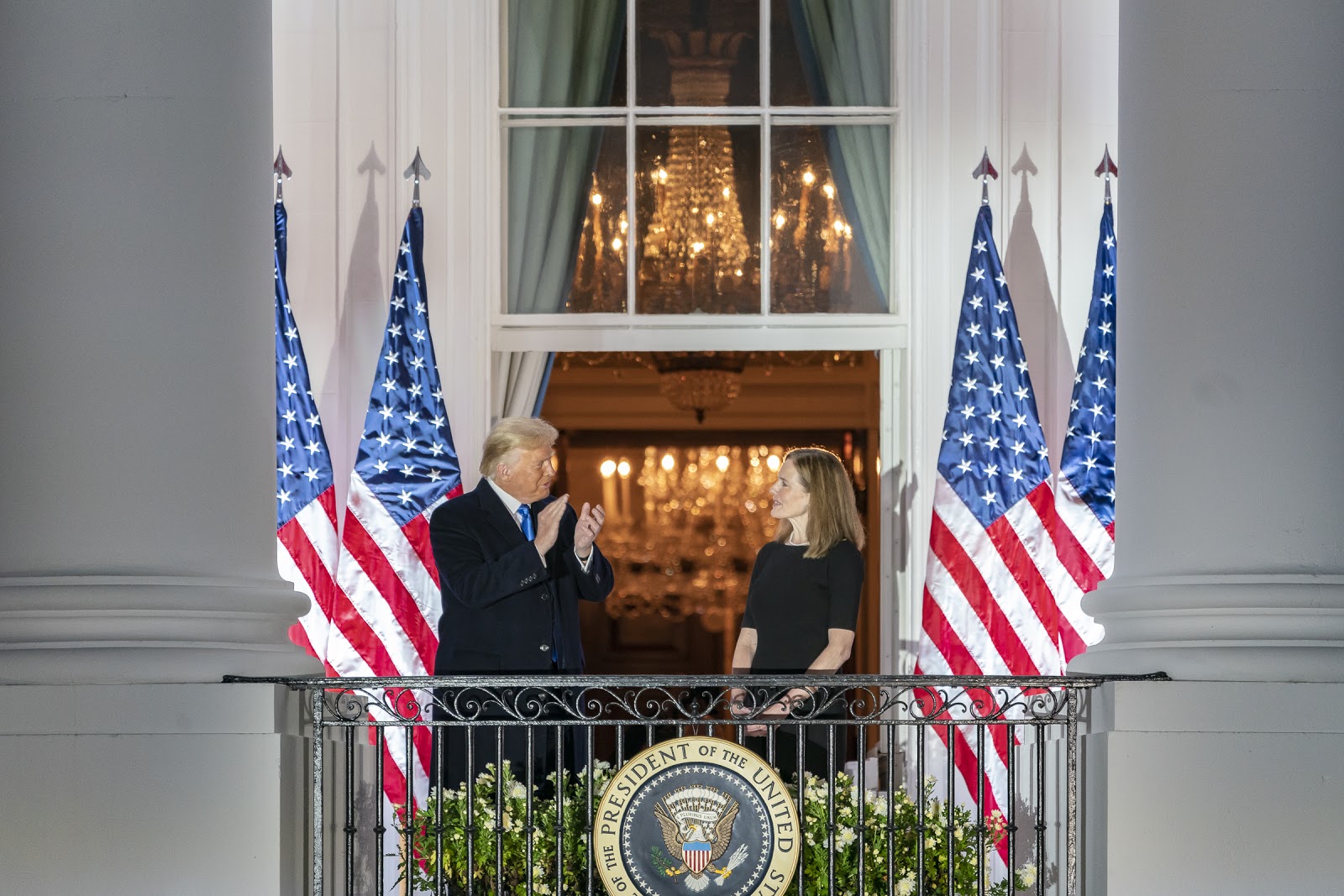President Trump applauds U.S. Supreme Court Associate Justice Amy Coney Barrett from the Blue Room Balcony of the White House Monday, October 26, after attending Justice Barrett’s swearing-in ceremony on the South Lawn. (Official White House Photo in public domain)
Justice Amy Coney Barrett recited the judicial oath Tuesday morning in a swearing-in ceremony, officially beginning her tenure as the 115th Justice on the Supreme Court. The Senate confirmed Barrett, with 52-48 vote, just over a week before the presidential election.
The Justice studied at the University of Notre Dame’s Law School, graduated first in her class, and was a clerk to Justice Antonin Scalia. Like Justice Scalia, she is an originalist, supporting the belief that judges should attempt to interpret the words of the Constitution as the authors intended when they were written.
Many liberals oppose that strict approach, saying there must be scope for moving with the times.
It’s difficult to know exactly how the new Justice will rule until she begins weighing in on cases. However, based on Barrett’s three years as a judge on the 7th U.S. Circuit Court of Appeals she is consistently conservative.
Here’s a breakdown of ten of the cases she examined during her years on the 7th Circuit Court:
Like any judge, Barrett has varied stances related to procedural issues on criminal justice matters. She has often issued opinions that don’t advance the goals of some criminal defendants and incarcerated people. It appears that she may be more open to ruling against the government when it comes to protecting individuals’ Fourth Amendment and Second Amendment rights.
Care, clarity, and a commitment to the interpretive methods used by Justice Antonin Scalia mark her rulings. While Justice Scalia’s methods occasionally drove him to liberal results, notably in cases on flag burning and the role of juries in criminal cases, Justice Barrett could be a different sort of Justice.
Of course, the most popular case people think Justice Barrett will have sway over is Roe v. Wade. It’s important to note that the Supreme Court may not hear a direct challenge to Roe anytime soon, preferring instead to consider cases that could chip away at abortion rights.
Justice Scalia wrote that the Constitution has nothing to say about abortion and that states should be allowed to decide the question for themselves. There is no reason to believe Justice Barrett disagrees.
In a tense questioning in 2017, Senator Diane Feinstein expressed concern that “the dogma lives loudly within” Barrett. Meaning the judge’s devout Catholic beliefs could influence her decision-making on the bench. Per the Associated Press, Barrett said her views have evolved and asserted that she believes judges should not “follow their personal convictions in the decision of a case, rather than what the law requires.”
In 2016, Barrett implied that the Supreme Court likely wouldn’t overturn the overall decision on Roe. She instead said that specifics on access and state-sanctioned restrictions could change. “I don’t think the core case, Roe’s core holding that women have a right to an abortion, I don’t think that would change,” said Barrett in a talk at Jacksonville University, per NPR
So while yes, Barrett is conservative, there’s no indication that she has any plans to overrule Roe v. Wade– if it even makes it to the Supreme Court.
Amy Coney Barrett does push the Supreme Court more to the right. Republican appointees now outnumber Democratic ones by a 6-to-3 margin. Despite a conservative record, until she starts weighing in on cases, there’s no need to think that she won’t follow precedents.

Hi! My name is Marie, and I am the editor-in-chief of The Mycenaean. I am also President of Model UN and President of Quill and Scroll Honor Society. I love whitewater kayaking and rollercoasters.
